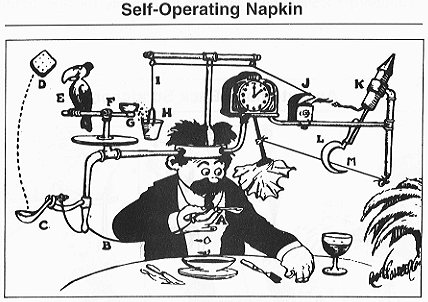Standards Fun.
- National Standards Bodies
- International Standards Bodies
- Recognized Standards Bodies
- Kinda recognized not exactly standards bodies
- Consortia
- Experts Groups
- Foundations
- ISO
- IEC
- ITU
- WSC
- ANSI (in the US)
- IEEE
- ECMA
- IDPF
- W3C
- IETF
- WHATWG
- Kronos
- MPEG
- X
- ITU
- etc
- etc
- etc
There are a lot of them
They are all the same in some ways, and very different in others
And they change.
a meta diversion...

~1800's: Industrialization
-
Steam Power
-
Semaphore Communications
-
Rotary engines
-
Telegraph
-
Railroad
-
Telephone

Number of Standards Bodies on the Planet
0

We only solve the problems we have.

This is hard to manage for everyone.
Lack of standardization is a literal
train-wreck.



New things require new language

1903: 1500 buildings burned in Great Baltimore Fire
The fire fighting equipment uses over 600 variants of hose size/couplings.
Competition run amok

Interop on a grand scale gets important relatively fast.
~1900
Engineering Associations
National Standards Bodies
~1915
~1950
~1980
~1995
~2005

This is all totally new, and the problems are changing even more
We've tried lots of models
- Business Groups / Experts Groups
- Consortia
- SDOs
So many variables
- Joint Patent Protections, smoke filled rooms
- Same, but license the specifications
- Free specifications, licensed implementations
- Certification Programs
- Legal Requirements
- Degrees of openness
- Pay to play
- "Pay to Play" but open
- and more.
~1900
Engineering Associations
National Standards Bodies
~1915
~1950
Business Groups
International Standards Bodies
Networking
IETF
~1980
W3C
~1995
ECMA
~2005
WHATWG
Number of Websites: 1
Number of Browsers: 1
Number of Standards Orgs: 0
Implementation as per spec
Not implemented
Implementation differs from spec (unique )
Implementation differs from spec (interop)
Other colors indicate vendor feature
caniuse if it existed ~1990
1992
22 websites and 7 Browsers
Date: Tue, 1 Dec 92 16:52:50 +0100
From: Tim Berners-Lee <timbl@www3.cern.ch> Message-Id: <9212011552.AA01907@www3.cern.ch> To: www-talk@nxoc01.cern.ch Subject: Lets keep the web together - CERN distributes a WWW protocol/parser library. - Tony Johnson is extending the MidasWWW code the other protocols. - Dave Ragget is writing a completely new browser. - Jim WhiteScarver is "going beyond the scope of WWW". - So are lots of others. - Dan Connolly is writing a definitive HTML engine for the new spec, - Dan was also making a parallel version of Midas. - At CERN, somone (else) is making a modified viola, - Pei Wei works on a new Viola with completely new parts. This is all great, except for two things: consistency and support. Getting the protocol code and parsing code right and tracking bugs and external changes will be some work, I feel that it is important that we do end up with common code. I know what it is like to have to maintain code on lots of platforms. You have to write the code specially. There are W3 code style guidelines in the web which say what we found out to be necessary. It's a pain. Noone is going to support 8 parsers on 12 platforms. I am therefore a little worried about the proliferation of implementations. (I know, I'm rather pleased about it too! :-) I would like to see one or maybe two definitive libraries around (two, so to test the first one for self-consistent bugs), but not four. I feel that if there are too many, then there will be cases of little things which work on one but not on the others, because there is not enough support effort for each. And we want to keep the quality high, in terms of reliability, conformance, and portability. The smarts are all very well. So could I encourage everyone with a bit of motherhood and apple pie. If you are thinking of a smart extra to EITHER HTTP or HTML then please define it and discuss it here on www-talk. Don't try just to get it out before the next guy. He is probably doing it too, a different way, and theese are all exciting ideas which benefit from being hacked around on the net. When the idea has come out, we can put it into a tentative "future" spec for comment and everyone can work from it. There is more than plenty of work for everyone out there! With all this drive we are going to accomplish some incredible things over then next few months. We don't need to be over-competitive, and we need to try to get things right first time. Jim's comment system is neat, and I'd like to adopt it here too. Tim http://lists.w3.org/Archives/Public/www-talk/1992NovDec/0134.html
1993
130 websites and 12 Browsers
1994
- Websites: ~2800
- Browsers: 16
- Standards Orgs: 1

Let's rein it in guys...
Giagianticus Corp
Warez 'R' Us
University of Research
Agency on Beauracracy
Aim:
Bring together
diverse interests to
work on a common
problem


Meanwhile...
HTML 3.2 / CSS / JS



This web is done.

Giagianticus Corp
Warez 'R' Us
Aim:
Bring together
important interests to
work on a common
problem, try to bring
some of the good bits
along, but not avoid
the bad bits
The Decider
WHATWG


HTML 5
Fin.

~2009

No Microsoft? No problem.

Maybe we need reforms?
Maybe we need to adapt again...

This was a compelling argument, it seems.


Ultimately, developers choose the standard
The platform exists, it needs to be explained and exposed


While they were busy trying to standardize light bulbs,
people polyfilled electrical sockets and gave us fans, heaters, stoves, refridgerators, clocks, and more.



Standards should make experimentation possible
Experiments have to be able to "fail"
Failing to become a standard for the world isn't a failure.
Standards bodies are really good at writing it down.
We have to change to embrace these ideas.
So, there have been a lot of changes over the past few years and more are coming
All work is open... mostly
Community Groups
Business Groups
Basic IP / Infrastructure for "Birds of a Feather" discussion
TC39 Stages
Esprima Parser
Babel
WICG: Web Incubator Community Group
A little more than that, experiments, expect failures
Houdini Task Force
Anyone can be involved...
Kinda.
Giagianticus Corp
Warez 'R' Us
University of Research
Agency on Beauracracy
Priority Management is one of the biggest problems
There is a natural tendency to exclude, not for intentionally evil reasons but because people need to advance according to their priorities in a voluntary process.
deck
By Brian Kardell
deck
- 793



